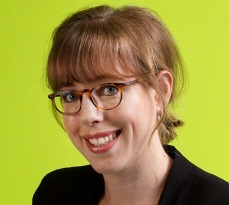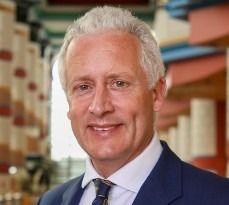Louisa Cox, Senior Director of Public Affairs at Mars Wrigley

Louisa graduated from the Cambridge Executive MBA in 2015.
What are your key areas of focus at Mars?
I’m Senior Director of Public Affairs at Mars Wrigley, where I focus on creating the type of progressive policy change that’s needed to ensure sustainable global supply chains. For example, at Mars we’ve been supporting the most recent corporate sustainability due diligence legislation in the EU. I’ve been calling for this regulation to be as robust and specific as possible, since it holds huge potential for ensuring that all cocoa imported into Europe is deforestation free, and that the human rights of farmers at the very bottom of the supply chain are properly prioritised and addressed.
How did you get into the sector and what made you decide to join the Cambridge Executive MBA?
Since leaving university, I’d worked with a number of NGOs in the humanitarian and international development sectors, including Save the Children and Fairtrade. I was lucky enough to spend a few years in Maputo, Mozambique very early in my career. I worked directly with communities recovering from the long civil war and flood disaster there. I noticed first-hand that in order to fix deeply entrenched social problems, NGOs need to work with the private sector.
I came across the Cambridge EMBA and could see that it would offer me an exciting pathway to get as insider perspective of the corporate world, both through the teaching programme and through networking with my peers. I was able to learn a huge amount about how corporates function and what drives them, and that was invaluable.
How did the EMBA help progress your career?
The EMBA gave me a deep and broad-based knowledge around key business functions such as corporate finance, accounting, strategy, innovation and marketing. Given that ESG is now integrated into core commercial practices, having this EMBA background has been a real enabler for me in terms of collaborating with leaders across my organisation to land transformational change.
Richard Pemberton, Managing Director of the Trumpington Farm company
Richard is a current student on the Cambridge EMBA.

What does your current role involve?
My current role is Managing Director of Trumpington Farm Company, a large-scale arable farming business that rents farmland from Kings College, Corpus Christi and Jesus Colleges. We also contract farms for the wider University of Cambridge. Alongside that, I’m a trustee of the National Institute of Agricultural Botany (NIAB), and have been investing in agritech start-ups since 2015.
What did you learn on the EMBA?
The programme has taught me how to be a more effective director, boosting my skills around corporate finance, accountancy, marketing, leadership, negotiation, organisational behaviour and operations management.
The network of colleagues and friends I’ve made at Cambridge has also been remarkable and has made me appreciate the huge benefits of working as part of a diverse team. As a direct consequence of being on the EMBA, I’m now setting up a new agri-tech growth fund with two colleagues.
What did your Individual Project (IP) involve?
My IP examined the viability of viticulture in Cambridgeshire, exploring the relationship between viticulture and the circular economy. The project has shown me that with increased temperatures, viticulture is a viable business proposition in Cambridgeshire, but choosing the right business model is critical. The UK viticulture market is growing fast but is highly competitive.
How has sustainability risen on the agenda for businesses and their leaders in recent years?
Sustainability and ESG have risen very fast on the agenda for UK farming businesses. Climate change and water shortages are especially relevant in agriculture.
We’ve found that our customers are now asking about our ESG credentials and are increasingly demanding that crops are produced in a sustainable manner. As owner and managing director of my business, ESG is always at the top of the agenda when considering future investment decisions and reviewing existing management practices. I believe adopting ESG principles provides a competitive advantage, as well as reducing waste, energy consumption and operating costs.
What do you believe will be the key challenges around sustainability and ESG in the future?
The key ESG challenge will be keeping up with the pace of innovation and changing regulations. Managing public opinion and expectations is another key challenge in our sector; agriculture consumes 70% of the world’s fresh water and is associated with CO2, methane and nitrous oxide emissions – but as an industry, it’s also essential to human life. ESG will continue to develop rapidly in the coming years, and I believe that adoption of ESG principles will be mandated by law for smaller businesses.
Sara Hasan, Vice President ESG regulatory reporting of Bank of America Merrill Lynch

What drew you to the Cambridge EMBA?
As an advocate for continuous learning, I wanted to pursue an Executive MBA to tap into emerging opportunities, enhance my entrepreneurial skillset and network with diverse cohort members.
The Cambridge EMBA offered all of the above, and in addition supported me with life-long learning through its annual elective offering post-graduation; this allows alumni to come back to Cambridge Judge annually and join existing cohort members for an elective course.
How did the programme help boost your knowledge around ESG?
I’ve always believed in ESG and having a corporate purpose, but the Cambridge EMBA helped me to explore solutions in the space and address a key sector gap. It introduced me to the concept of a circular economy, which I believed in and wanted to contribute towards. The programme was instrumental in enabling me to reflect on and then act on my career aspirations, and helped me to re-align my skillset to find a balance across industry demands, academic research and my passion for ESG.
What practical experience did you gain on the EMBA?
As part of an EMBA consulting project, I was given an exciting opportunity to contribute to a research milestone for the European Commission. The project was conducted as a secondment in Brussels in partnership with Deloitte Brussels. I further expanded my expertise in the area by conducting an individual research project which proposed an ESG Matrix for the financial sector.
What tips do you have for those considering a career in the sector?
I would strongly recommend learning more about the area through university resources, certifications and offerings by CISL. In addition, actively participating in and networking at conferences in the sector, such as the UN COP, is essential to making yourself known by establishing key contacts in the field, as well as hearing first-hand insights and updates from current leaders in the space.
Given this is an emerging area, there are many new opportunities to explore. I’d recommend thinking outside the box and identifying sector gaps and other niches to tap into. The journey ahead is tough and has a lot of unknowns, but if you put yourself forward you can really make a mark in this exciting, rapidly changing sector, and help bring forward a sustainable future for all.


